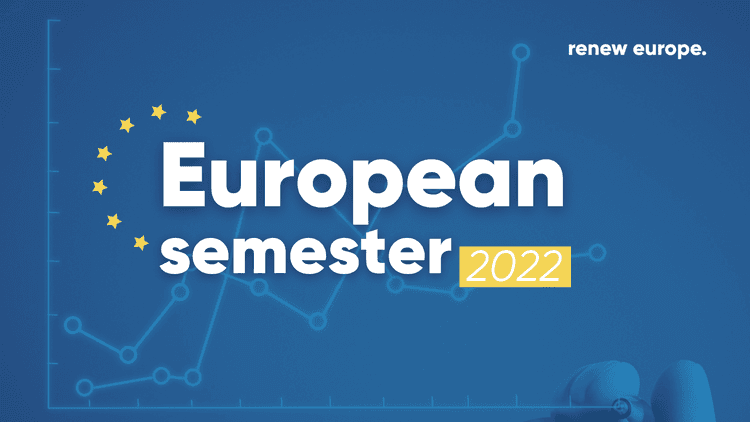European Semester must consider the impact of the Russian invasion of Ukraine on the EU’s economy and employment

The Renew Europe Group in the European Parliament believes that the EU’s recovery provides a unique opportunity to build back a stronger EU, by providing guidance to Member States on where reforms and investments are most needed in order to accelerate the transition to a more sustainable, digital, resilient and inclusive EU.
During today’s plenary debate on the European Semester´s economic and employment aspects for 2022, our political group made it clear that it is time to provide financial support for implementing growth enhancing and sustainable structural reforms to deliver on growth and jobs and social and economic investments, which would support the recovery efficiently, boost competitiveness and increase convergence within the EU.
In addition, Renew Europe outlines that the conflict in Ukraine and the severe sanctions against the Russian Federation will unavoidably entail negative effects on the EU economy, and welcomes the fact that most political groups in the Parliament agreed to call on the Commission to identify and facilitate means and ways to address the economic and social consequences of the sanctions.
The European Semester is a crucial instrument in the context of the current crisis to ensure good and coordinated economic and employment governance, as well as Member States’ responsiveness to the challenges facing EU with the tools under the Recovery and Resilience Facility (RFF).
Luis Garicano (Ciudadanos, Spain), Renew Europe Vice-President and coordinator on Economic and Monetary Affairs committee (ECON), stated:
“We are living through the start of Europe´s third recession in as many years. The ECB has its hands full containing inflation and cannot be expected to do much more. Therefore, the only credible tool to respond to this crisis is fiscal policy. This war will be expensive for Europe; collective defence to protect Europeans, the assistance to millions of Ukrainians fleeing the war, as well as measures aimed at cushioning the blow of increasing gas prices, and to make massive investments in our energy security. Unfortunately, European countries do not have the necessary fiscal space. The only feasible game in town is Europe. We need to agree on a new Recovery Fund, coupled, at the same time, with an independent fiscal agency to ensure a credible fiscal consolidation path”
Dragoş Pîslaru (USR, Romania), Chair of the Employment and Social Affairs Committee (EMPL), declared:
“The irresponsible act of aggression on Ukraine, an independent country, will most certainly reflect in long-term economic and social consequences for the European Union. The moment to reflect on the EU economic governance framework has come. To address the pandemic, we ambitiously created the Recovery and Resilience Facility and we have important lessons to learn from it. To ensure our strategic autonomy we have to tackle the challenges coming from the dual transition - green and digital, to ensure the social resilience, especially of our health systems, as well as the economic wellbeing, security and defence”.